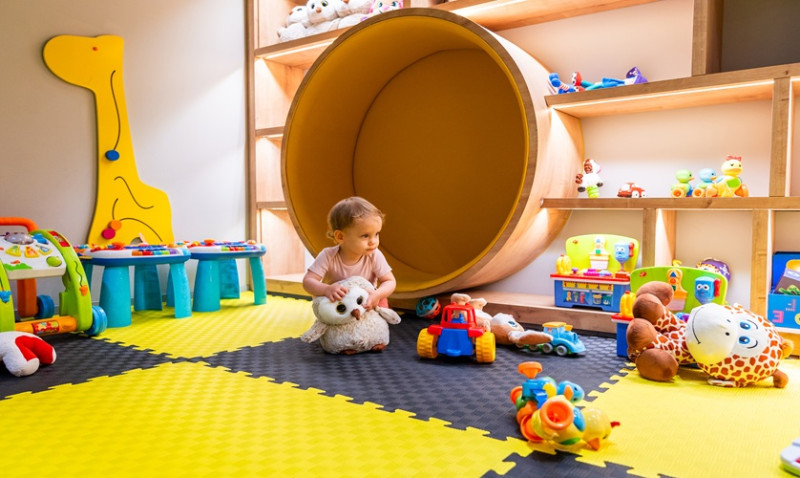
When it comes to hiring a child care provider, whether a nanny, childminder, or nursery worker, the interview process plays a critical role in selecting the best candidate. For families in the UK – particularly young professionals managing busy schedules – finding someone trustworthy, experienced, and compatible with your household is essential. The same goes for guardians, designers of childcare spaces, or even DIY enthusiasts involved in building safer homes. To help ensure the safety and happiness of your children, we’ve compiled a comprehensive list of common child care interview questions and the best ways to answer or evaluate them.
This blog post provides you with a complete understanding of the interview process for child care services – making it easier for you to feel confident in the decisions you make. Whether you're conducting the interview or preparing for one, this guide covers everything you need to know. Let’s dive in.
1. Tell Me About Your Child Care Experience
This question is often the icebreaker, and it gives you insight into the candidate’s background. Ask them to detail their prior jobs, ages of children they’ve cared for, and the length of time they’ve stayed in those positions. Look for consistency – stable, long-term relationships with previous families show reliability and commitment.
Listen for specifics: did they care for infants, toddlers, or school-aged children? Different age groups require varying skills and levels of attentiveness, so their experience should align with your family’s needs.
It’s a bonus if they’ve handled children in a situation similar to yours – for example, working with multiple siblings, or handling children with allergies or mild developmental delays. Even experience in nurseries or as a teaching assistant counts as valuable context.
The ideal answer will outline their hands-on responsibilities (meal prep, educational play, bedtime routines) and express genuine enthusiasm about caring for children.
2. What Would You Do in Case of an Emergency?
Safety is paramount. This question helps gauge the candidate’s response under pressure. They should be able to walk you through how they’d react in the event of a fall, allergic reaction, choking hazard, or even a fire. Ask them to be specific – what first aid training do they have? Do they know how to contact emergency services, and who else they should notify?
In the UK, possessing a pediatric first aid certificate is often a standard requirement, especially for registered childminders. This can give parents significant peace of mind. Make sure to check the expiration dates on any certifications shared.
A good candidate will be assertive and calm in their explanation. You can also test them with a hypothetical: “A child is playing outside and scrapes their knee badly – what do you do?” Their response should clearly outline both emotional support (comforting the child) and medical handling (cleaning the wound, applying a plaster, observing for signs of deeper injury).
Don’t forget to inquire about familiarity with your home’s layout and safety equipment – child gates, medicine storage, smoke alarms, etc.
3. How Do You Handle Discipline?
This interview question helps determine whether their philosophy aligns with your parenting style. In the UK, most parents and educational bodies endorse the idea of positive reinforcement over punishment, and this should reflect in their response.
Ask how they deal with tantrums, biting, refusal to eat, or sibling disagreements. Do they use time-outs? Redirect negative behaviour? Praise good conduct? The more experience a carer has, the more diverse examples they can offer.
The key is that the carer sets safe and reassuring boundaries. Use this moment to discuss your own preferences: do you expect consistent routines, standard rules, reduced use of screens, etc.? Their willingness to adapt shows their flexibility and professionalism.
Watch for red flags – any mention of shouting, physical discipline, or shame-based methods should signal caution and further questions.
4. What Activities Do You Typically Do With Children?
Children thrive on stimulation and learning through play, so it’s important to have a provider who brings creativity and structure to daily routines. This question helps uncover if the candidate can engage your child in an age-appropriate, development-friendly way.
Ideal responses involve both indoor and outdoor concepts – such as arts and crafts, story reading, educational games, walks to the park, visits to museums, or playing with construction toys. Look for a balance between physical and cognitive activities, screen time moderation, and social skills development.
Bonus tip for DIY-inclined or design-minded parents: ask if they’re happy to incorporate your child’s bedroom or playroom setup into their activity plan. Some nannies get really creative with toy rotation, sensory bins, and setting up curiosity corners.
You might also assess how select candidates use seasonal or local UK events (e.g. Easter, Book Week, National Trust trails) to enrich a child’s learning experience.
5. How Do You Handle Meals and Nutrition?
Eating well is essential, especially for growing children. This question explores your carer's ability to prepare nutritious meals, manage allergies, and encourage healthy habits. Whether you have a picky eater or a toddler navigating new foods, this answer is highly revealing.
Ask about their experience with meal preparation: can they follow a specialised diet (vegetarian, gluten-free, nut-free)? Do they cook fresh meals from scratch, or reheat pre-prepared dishes? How involved do they like the children to be in cooking and snack prep?
If your family follows any dietary principles (Halal, Kosher, organic), now is the time to discuss them. Some families in the UK also expect sit-down, no-TV mealtimes, while others are more relaxed. See how the candidate adapts to that philosophy.
Don't forget to ask about their understanding of portion control, hydration, and their general food hygiene standards. If they’ve completed a food safety course or possess a Level 2 Food Hygiene Certificate, that's a definite plus.
6. Can You Provide References From Past Families or Employers?
Don’t skip this one. References offer tangible proof of reliability. Most experienced carers have a portfolio or collection of contactable referees who will speak honestly about their demeanour, dependability, and nature with children.
Ask for at least two references and request they include both a phone number and email, preferably from different families or workplace settings. You could follow up with specific questions such as: “Did they always arrive on time?”, “Were your children happy and comfortable?”, or “Would you rehire them?”
If they’ve taken time off or haven’t worked in child care recently, evaluate their explanation with sensitivity. Sometimes gaps are due to maternity leave, study, or moving – not necessarily red flags.
If they are registered with Ofsted (as required for some types of carers in the UK), this can also come with inspection reports you might request to see.
7. Are You Comfortable With Additional Responsibilities?
Sometimes, families need a carer who can handle more than just watching the children. If your expectations include light tidying, help with homework, school runs, or even pet care, clarify this now. Transparency in both directions is key for a smooth relationship.
Pose this question respectfully. It's not uncommon for UK families, especially in urban areas like London or Manchester, to look for a nanny-housekeeper hybrid. However, boundaries need to be clearly defined from day one.
If possible, you could present a sample weekly task list and ask the carer to comment on what they feel comfortable doing. Their feedback can guide you in adjusting responsibilities or offer training if needed.
Be honest about expectations: “We sometimes arrive home late from work; can you be flexible on pick-up times?” or “Would you be available for evening babysitting occasionally?” Proactive communication helps prevent misunderstandings down the road.
8. How Do You Communicate With Parents?
This might be one of the most important soft-skill related questions. At the end of the day, you want a carer who keeps you in the loop. Whether it's a simple WhatsApp message about a nappy change or a full daily log of feeding times and naps, you’ll want to agree on the right level of reporting together.
Ask how they have approached this in past roles. Did they have a shared notebook with the family? Did they send updates via photos? Were formal review meetings held once a week?
Even experienced carers can evolve their style to match yours – so don’t hesitate to express your communication preferences. You may appreciate end-of-week summaries, or want immediate alerts if a child gets sick or upset during the day.
Bonus: many UK nannies now use child care apps like “Baby Connect”, giving families live access to input logs and journals. If tech-familiar, this could elevate daily care standards significantly.
Final Thoughts: Choosing the Right Child Carer in the UK
Hiring a child care provider is not just about ticking boxes – it's about building a relationship based on trust, reliability, and shared values. From meal planning and safety to emotional connection and resilience under pressure, every detail counts. Use these questions as a launchpad to tailor interviews that fit your unique household, childcare needs, and family values.
In today’s UK landscape where both parents are often working or engaged in professional projects, having the right support system at home can make all the difference. Whether you're a London-based architect, a couple redecorating a nursery in Sheffield, or a Manchester professional juggling remote work, ensuring your child receives responsive and loving care is the true goal.
Need more tips? Explore other parenting support articles on our blog, covering home improvement for families, child-safe paint ideas, and DIY toy storage solutions.




